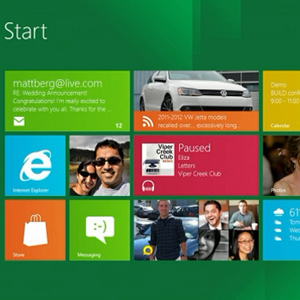 Microsoft has big plans for Windows 8’s touch interface, but at the moment, those plans don’t include Adobe Flash.
Microsoft has big plans for Windows 8’s touch interface, but at the moment, those plans don’t include Adobe Flash.
The company said today that Windows 8 will include two versions of Internet Explorer, but its “Metro style” touch-specific version will not support plugins like Adobe Flash.
Instead, like Apple, Microsoft is betting on HTML5.
“For the web to move forward and for consumers to get the most out of touch-first browsing, the Metro style browser in Windows 8 is as HTML5-only as possible, and plug-in free,” wrote Dean Hachamovitch, head of Microsoft’s IE team, in a blog post. “The experience that plug-ins provide today is not a good match with Metro style browsing and the modern HTML5 web.”
Hachamovitch continued his reasoning further, saying that keeping Metro-style IE plug-in free “improves battery life as well as security, reliability, and privacy for consumers. … Providing compatibility with legacy plug-in technologies would detract from, rather than improve, the consumer experience of browsing in the Metro-style UI.”
This sort of reasoning closely echoes former Apple CEO Steve Jobs, who publicly shunned Flash in April 2010 when he wrote that it will never run on iPhones, iPods and iPads and that “Flash is no longer necessary to watch video or consume any kind of web content.”
Both Jobs and Hachamovitch appear to agree that HTML5 content is the future when it comes to consuming the web on mobile and touch devices. Tablets and smartphones have seen staggering growth the past few years, with several more years of growth ahead predicted by Gartner, Current Analyis, and other research firms. It’s important for the web to be tailored properly for these low-powered devices.
Regardless of most mobile browser incompatibility (Android does support some Flash content), many websites still use Flash to the operate and to work on mobile devices they must deploy native applications. One recent example is Turntable.fm, which uses Flash plugin to run streaming music through traditional web browsers but offers a native iOS application to access the service on the iPhone.
Both versions of IE10 on Windows 8 will use the same rendering engine, but people that want to use Windows 8 but need or want access to Flash-enabled sites will still be able to run on the edition of IE10 targeted at desktops and laptops.
Do you think Microsoft made the right move in removing plugins from Metro-style Internet Explorer 10?


